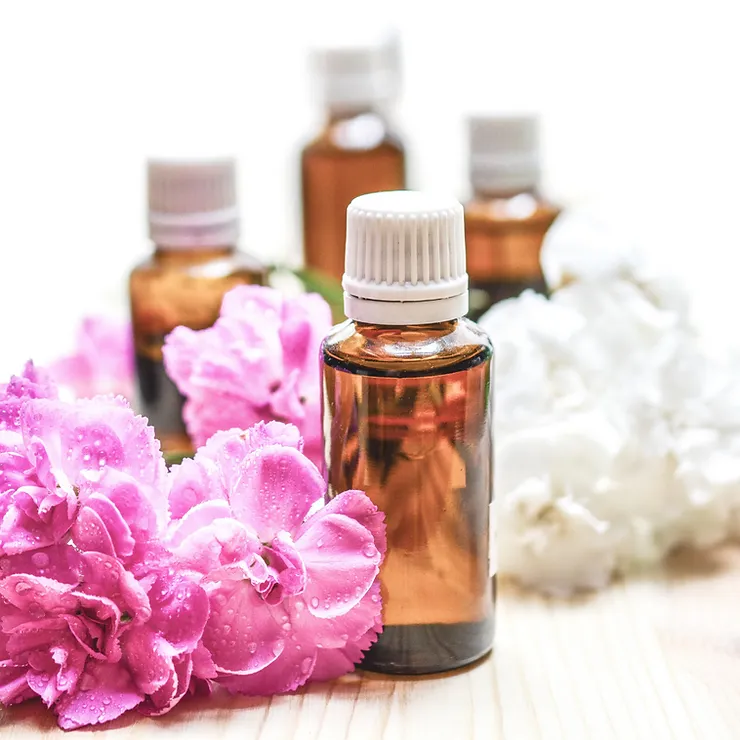I hate to break it to you, but there's no magic potion that can cure your insomnia. So I'm not promising a quick fix here. However, some alternative therapies can help you relax so you sleep more deeply and peacefully. One of those is essential oils.
There are more and more studies being done on essential oils, primarily on lavender. Lavender has been shown to increase the amount of time people spend in deep sleep and people are reporting in these studies feeling more well rested when using it before bed or diffusing it in their room.
It turns out there are additional scents besides lavender that can help you sleep better. I’ve experienced this for myself so I’m excited to share these with you today.
Quality is important
First of all, the quality of the essential oils you use is important. Some companies use chemicals or fragrances in their oils and source them from unknown places so you want to make sure you’re getting them from a reputable company. I joined Young Living last year and I think their oils are amazing. However, I don’t like paying the inflated cost to support their MLM business scheme. Luckily I found a company called Revive that claims to be the same quality as Young Living and DoTerra but without the high price tag. They have similar blends that smell identical to me so I’m happy switching companies.
Essential oils for sleep
I fell in love with Young Living’s Peace & Calming blend with ylang ylang, orange, tangerine, patchouli, and blue tansy. Revive has the same blend called Zen. These oils help you relax and unwind. Revive also has a Sleep blend with geranium, ho wood, coriander seed, lavender, roman chamomile, lemongrass, lemon peel, ylang ylang flower, jasmine, and rose that smells divine.
If you want single oils, I recommend chamomile, jasmine, clary sage, sweet marjoram, and bergamot for sleep and relaxation.
Oils to avoid
You want to avoid citrus scents (unless they’re in small amounts in a blend), peppermint, spearmint, rosemary, cinnamon and ginger since they’re more stimulating and meant to energize you.
How to use essential oils for sleep
1. Straight from the bottle
You won’t get all the notes from the oil if you only smell it from the bottle. So you want to put a drop of the oil on your palm and rub it between your hands in a circular motion. Then cup your hands toward your face and take a few deep breaths to inhale the scent. The aroma takes 30 seconds to get to your brain and start working.
2. Roll-on
Fill a 1 ounce roller ball with a carrier oil. For a carrier oil, I like grapeseed best because it has virtually no smell. You can also use olive oil, almond oil, etc. Add 15 drops of essential oil. Rub this in your hands and the bottom of your feet before bed or during the night if you can’t sleep. The oil will absorb into your skin and bloodstream. Diluting the oil is still powerful but makes your oils last a lot longer.
3. Diffuser
Add a few drops of the oil to a diffuser an hour to 30 minutes before bed.
4. Use it in the bath
Taking a bath before bed can help you sleep better in and of itself. But adding essential oils (and epsom salts) will magnify a bath’s sleep-enhancing qualities. Put 10 drops of oil into the running bath water and the oils will absorb into your skin while you soak.
Although I love science, I keep getting more and more into the woo side of things the older I get. Essential oils have helped me so much with my sleep that I can’t help but share it with you. I love to give these oils as gifts to my clients as we’re working to figure out their sleep.
Next week I'm going to start getting into more of the science and nitty-gritty of some little-known reasons why you might not be sleeping. These are things that I learned in Bali through my mentorship with Christine Hansen from Sleep Like A Boss. I’ll be covering nutrition and underlying health issues and how those affect our sleep.
Essential oils can be helpful especially if you have an occasional sleeplessness. But for people with chronic insomnia or who have been to your doctor or maybe even been tested at a sleep clinic and they’re showing that nothing is wrong, something’s obviously going on in your body. Insomnia is just your body's way of saying that things aren't right.
The good news is that your sleep is fixable and figureoutable (borrowed from the inspirational Marie Forleo).
So if you’ve been suffering from insomnia for years and you can’t figure out why, stay tuned the next few weeks as I dive deeper into the science of sleep and health. Until then book a call with me to start your journey.

